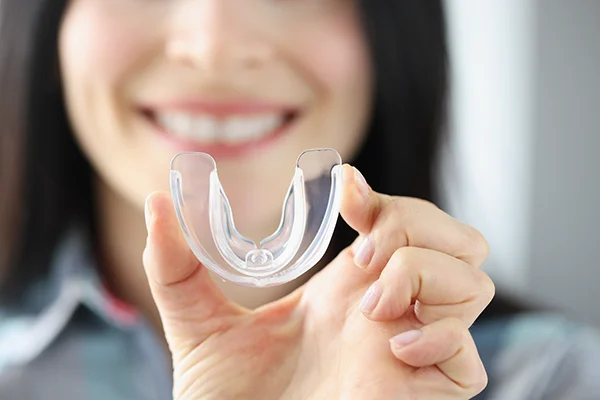Mouth guard
Dentist McHenry, IL
 Many people wear mouthguards throughout the night in order to protect their teeth and overall health. There are several different conditions which nighttime mouthguards can be used to treat. There are also several different types of mouthguards available to treat these conditions. At McHenry Smile Center, we will explain the available mouthguard options and how to maintain it. Many people wear mouthguards throughout the night in order to protect their teeth and overall health. There are several different conditions which nighttime mouthguards can be used to treat. There are also several different types of mouthguards available to treat these conditions. At McHenry Smile Center, we will explain the available mouthguard options and how to maintain it.
Conditions Treated
There are two main conditions that mouthguards can treat; bruxism and sleep apnea. Bruxism is a condition in which the patient grinds their teeth together while they sleep. This can be a painful condition and can also cause long term damage to their teeth. Mouthguards do not stop you from making the grinding motion in your sleep, but they do create a barrier between your upper and lower teeth. Though you are trying to grind your teeth together, they cannot touch. This alleviates common bruxism symptoms such as jaw and tooth pain, swelling, headaches, and fatigue.
Sleep apnea is a condition which causes the patient to temporarily stop breathing while they sleep. There are a few different types of sleep apnea, though two of them can be treated with a mouthguard. Obstructive sleep apnea results from muscles relaxing whereas central sleep apnea results from the brain not sending proper signals. Complex sleep apnea is a combination of both. Mouthguards can help with obstructive and complex sleep apnea by forcing the jaw forward and keeping the airway open throughout the night.
Mouthguard Types
You can choose between a hard or a soft mouthguard. Hard mouthguards are less comfortable, but they are great for treating more severe conditions and they are more durable. Soft mouthguards are less durable and less effective, which is why they are used for more mild forms of bruxism and sleep apnea. They are also more comfortable. Dual laminate mouthguards are a nice middle ground of comfort and durability. These are used for moderate cases.
In addition, there are several ways that you can purchase a mouthguard. For the cheapest option, you can get a stock mouthguard from a retailer. These are all the same size and shape, so they are not very effective for severe conditions. Boil and bite mouthguards can be formed to your teeth after heating them in boiling water. However, this is still not totally fitted to your teeth.
For severe bruxism and sleep apnea, we recommend custom mouthguards. We partner with a dental lab to create a mouthguard that is perfectly molded to your mouth. These are hard mouthguards. We make them by getting a dental impression that the lab then uses to mold a mouthguard. We can adjust the fit as needed and you should bring your mouthguard to each appointment. There are some companies that can send you a kit for you to make a dental impression by yourself and send it back. They would then send you a mouthguard based on this mold.
Wash your mouthguard daily and store it in a case when you are not wearing it to ensure it is always clean. Use soap and warm water. For additional information on nighttime mouthguards, call (815) 578-1000 today.
|